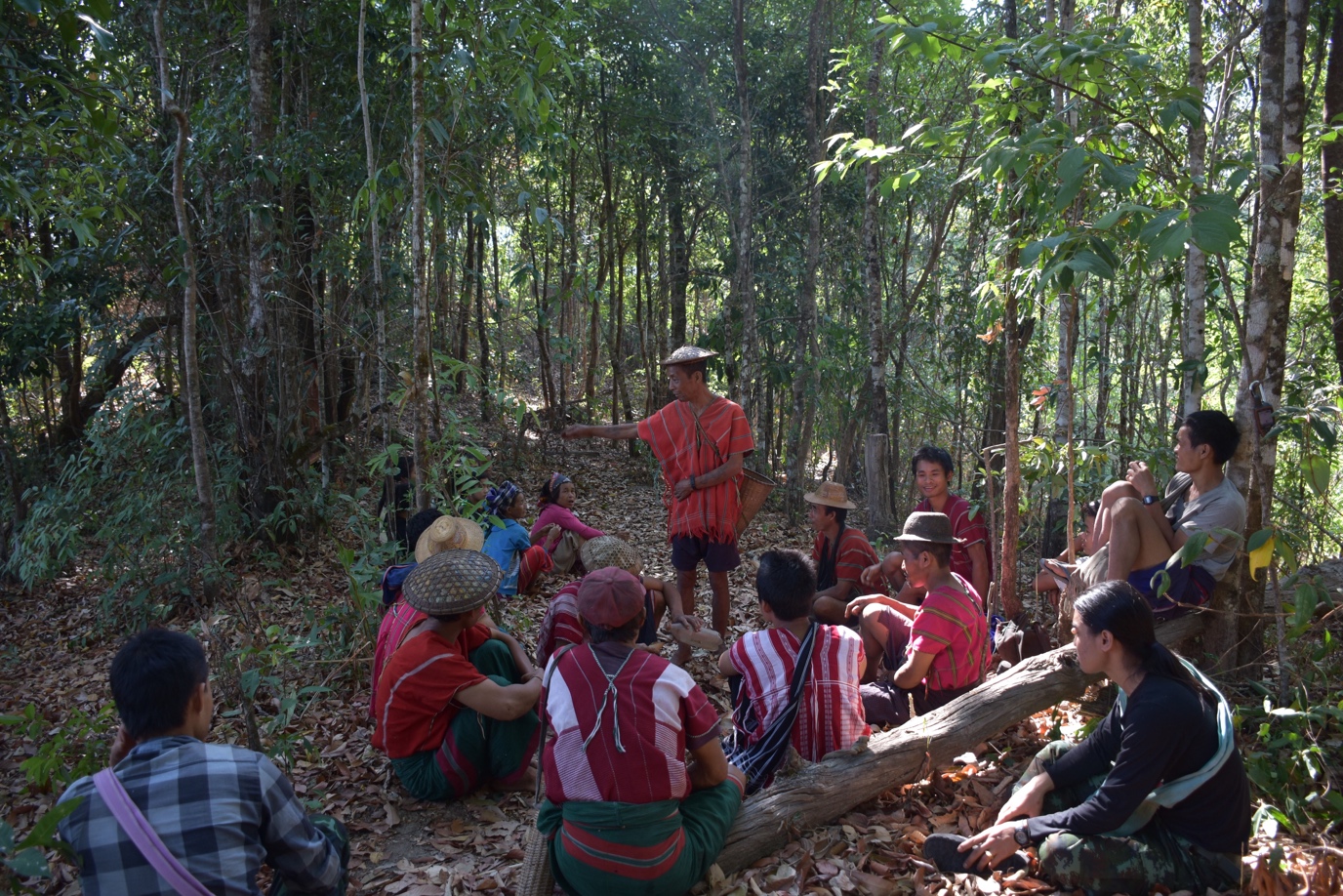|
|
|
မြန်မာနိုင်ငံ ဓလေ့ထုံးတမ်းမြေနှင့် ကျင့်သုံးမှုစနစ်များဆိုင်ရာ အခွင့်အရေး သဘောထားရပ်တည်ချက် - (ဖက်ဒရယ်ဒီမိုကရေစီနိုင်ငံတွင် မဖြစ်မနေထည့်သွင်းစဉ်းစားရန်များ) အပေါ်
Position Paper on the Rights to Customary Land and Practice Systems in Myanmar
Essentials to consider for a Federal Democratic country
A TNI Commentary
|
|
 Indigenous Karen communities work together and measure their village boundaries according to their customary practices; Kloh Mae Kaw village, Hpapun District. / Photo credit KESAN Indigenous Karen communities work together and measure their village boundaries according to their customary practices; Kloh Mae Kaw village, Hpapun District. / Photo credit KESAN |
|
|
|
|
An interesting position paper is posted on the website of Land in Our Hands (LIOH), a network of local organizations working on land issues since at least 2014. It was researched and co-authored by a group of local organizations, committees and working groups who have been working on land in their own ways and territories – some well-known and longstanding, and some preferring to be anonymous (due to the security situation). The position paper is part of their advocacy for ‘genuine’ recognition and deeper understanding of customary land systems and also for a federal union in which customary land systems have a place.
"First, we hope to help push forward and strengthen the movement for full and meaningful recognition of indigenous ethnic peoples and their customary land rights and land management systems. Second, we hope to help all those who are seeking to help build a truly just society in Myanmar, to understand and respect the existence and importance of villagers’ customary land systems and assist in our efforts to get them fully and meaningfully recognized and respected, restituted and protected, as a step toward achieving a more general land reform process that puts people, nature and the planet before profits. Third, we hope to help prepare the way for the establishment of a federal union that is built on real peace within and between communities and on pro-people land governance based on customary land practices.”
The research upon which the paper is based shows that many customary land systems remain more or less operative today, despite the current turmoil. But their survival and the survival of the people who benefit from them (directly and indirectly) are under threat. The position paper highlights factors working against the well-being of customary land systems and their inhabitants.
|
|
|
|
|
|
|
မြန်မာနိုင်ငံ ဓလေ့ထုံးတမ်းမြေနှင့် ကျင့်သုံးမှုစနစ်များဆိုင်ရာ အခွင့်အရေး သဘောထားရပ်တည်ချက်
(ဖက်ဒရယ်ဒီမိုကရေစီနိုင်ငံတွင် မဖြစ်မနေထည့်သွင်းစဉ်းစားရန်များ) အပေါ်
|
|
 ဓလေ့ထုံးတမ်းစနစ်များအရ ဌာနေကရင်လူမှုရပ်ရွာများ အတူတကွ ပူးပေါင်း၍ ၎င်းတို့၏ ကျေးရွာ နယ်နိမိတ်များအား တိုင်းတာကြခြင်းနှင့် သဘောတူညီမှု ပြုကြခြင်း။ ကလိုမဲကော် ကျေးရွာ၊ ဖာပွန်ခရိုင်။ ဓာတ်ပုံ/ Photo credit KESAN
ဓလေ့ထုံးတမ်းစနစ်များအရ ဌာနေကရင်လူမှုရပ်ရွာများ အတူတကွ ပူးပေါင်း၍ ၎င်းတို့၏ ကျေးရွာ နယ်နိမိတ်များအား တိုင်းတာကြခြင်းနှင့် သဘောတူညီမှု ပြုကြခြင်း။ ကလိုမဲကော် ကျေးရွာ၊ ဖာပွန်ခရိုင်။ ဓာတ်ပုံ/ Photo credit KESAN
|
|
|
၂ဝ၁၄-ခုနှစ်လောက်မှစ၍ မြေယာအရေးလှုပ်ရှားဆောင်ရွက်လာခဲ့သော ဒေသခံအဖွဲ့အစည်းများ၏ ကွန်ရက် တစ်ခုဖြစ်သည့် ဒို့မြေကွန်ရက်(LIOH) ဝက်ဘ်စာမျက်နှာတွင် စိတ်ဝင်စားဖွယ် ရပ်တည်ချက် စာတမ်း တစ်စောင်ကို တွေ့ရှိရပါသည်။ အဆိုပါစာတမ်းကို သက်ဆိုင်ရာဒေသများတွင် ကိုယ်ပိုင်ပုံစံအသီးသီးဖြင့် မြေယာအရေးလှုပ်ရှားဆောင်ရွက်လျက်ရှိနေသည့် ဒေသခံအဖွဲ့အစည်းများ၊ ကော်မတီအစုအဖွဲ့များနှင့် လုပ်ငန်းအဖွဲ့များက အတူတကွ လေ့လာဆန်းစစ်၍ ပူးပေါင်းရေးသားထားခြင်းဖြစ်သည်။ အဖွဲ့များတွင် ကာလရှည်ကြာစွာ စုစည်းတည်ရှိခဲ့ကြသည့် အစုအဖွဲ့များ၊ လူသိများသည့် အဖွဲ့အစည်းများအပြင် (လုံခြုံရေးအခြေအနေကြောင့်) အမည်မဖော်လိုသည့် အဖွဲ့အစည်းများလည်း ပါဝင်သည်။ စာတမ်းသည် ဓလေ့ထုံးတမ်းမြေစီမံမှုစနစ်များအား အမှန်တကယ်နားလည်သဘောပေါက်ပြီး ‘စစ်မှန်သော အသိ အမှတ်ပြုမှု’ ဖြစ်လာရေးနှင့် ယင်းစနစ်များရှင်သန်နိုင်သည့် ဖက်ဒရယ်ပြည်ထောင်စုတစ်ရပ် ဖြစ်လာရေးတို့ အတွက် ကြိုးစားအားထုတ်မှု တစ်စိတ်တစ်ပိုင်းလည်းဖြစ်သည်။
"ပထမအနေဖြင့် ဌာနေတိုင်းရင်းသားလူမျိုးများ တည်ရှိနေမှု၊ ၎င်းတို့၏ ဓလေ့ထုံးတမ်း မြေအခွင့်အရေးနှင့် မြေယာစီမံကျင့်သုံးမှုစနစ်များအား အပြည့်အဝ အသိအမှတ်ပြု ကာကွယ် မြှင့်တင်ရေး လှုပ်ရှားမှုများကို ရှေ့ဆက်တွန်းအားပေးနိုင်ရန်နှင့် အဆိုပါလှုပ်ရှားမှုများ အားကောင်း စေရန် မျှော်လင့်သည်။ ဒုတိယမှာ မြန်မာနိုင်ငံတွင် စစ်မှန်၍ မျှတမှုရှိသော လူမှု အသိုက်အဝန်းတစ်ရပ် တည်ဆောက်ရန် ကြိုးပမ်းနေကြသူအားလုံးကို ဓလေ့ထုံးတမ်း မြေယာစီမံမှုစနစ်များ၏ အရေးကြီးပုံနှင့် တည်ရှိမှုများအပေါ် နားလည်မှုရှိလာရေး အထောက်အကူ ပြုရန်ဖြစ်သည်။ ထိုမှတဆင့် အဆိုပါစနစ်များပေါ် လေးစားမှု နှင့် အသိအမှတ်ပြုမှုရှိပြီး လူ၊ သဘာဝပတ်ဝန်းကျင်နှင့် ကမ္ဘာမြေအား ပို၍တန်ဖိုးထားသည့် အထွေထွေမြေယာပြုပြင်ပြောင်းလဲ ရေးဖြစ်စဉ်ကို ဦးတည်နိုင်ရန်မျှော်လင့်ပါသည်။ တတိယအချက်အနေနှင့် ဓလေ့ထုံးတမ်း မြေယာ ကျင့်သုံးမှုစနစ်များအပေါ် အခြေခံ၍ ပြည်သူလူထုကို ဦးစားပေးသည့် မြေယာစီမံအုပ်ချုပ်မှု၊ လူ့အဖွဲ့အစည်အတွင်းနှင့် လူ့အဖွဲ့အစည်းများအကြား စစ်မှန်သောငြိမ်းချမ်းရေးကို အခြေတည်သည့် ဖက်ဒရယ်ပြည်ထောင်စု တည်ဆောက်ရာတွင် အထောက်အကူပြုရန် မျှော်လင့်ပါသည်။"
လက်ရှိအကြပ်အတည်းဆိုက်လျက်ရှိသည့် အခြေအနေများ၌ပင် ဓလေ့ထုံးတမ်းမြေစီမံမှုစနစ်များသည် အနည်းနှင့် အများဆိုသလို ကျင့်သုံးလည်ပတ်နိုင်နေဆဲဖြစ်သည်ဟု ဤစာတမ်းအတွက် အခြေခံထားသည့် သုတေသနဆန်းစစ်ချက်များက ညွှန်းဆိုလျက်ရှိသည်။ သို့ရာတွင် အဆိုပါစနစ်များနှင့် ၎င်းစနစ်များထံမှ (တိုက်ရိုက်ဖြစ်စေ၊ သွယ်ဝိုက်၍ဖြစ်စေ) အကျိုးခံစားနေရသူများ၏ ရှင်သန်ရပ်တည်ရေးသည် ခြိမ်းခြောက် ခံရလျက်ရှိသည်။ ရပ်တည်ချက်စာတမ်းမှ ဓလေ့ထုံးတမ်းမြေစနစ်များ၊ ၎င်းစနစ်များအတွင်း ကျင့်သုံး နေထိုင်ကြသူများ၏ သာယာဝပြောမှုအပေါ် ခြိမ်းခြောက်လျက်ရှိသည့် အချက်အလက်များကို မီးမောင်း ထိုးပြပေးထားသည်။
|
|
|
|
|
|
|
|